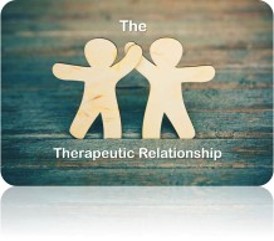Feedback-Informed Treatment (FIT) — using measures to solicit feedback about progress and the quality of the therapeutic relationship — is a transtheoretical, evidence-based approach. The most recent research shows clients whose therapists use FIT on an ongoing basis are 2.5 times more like to experience benefit from treatment.
But how does it work?
Quick. Take a guess.
Under the first shell: FIT works because clinicians use measures to monitor their performance. The second: Feedback helps clinicians select the most effective treatment methods. Third: FIT enhances the therapeutic relationship.
If you guessed the “proverbial pea” was under the third shell, you’re right. Hard to believe given: (1) the emphasis placed on measurement and treatment methods by researchers and advocates of various scales; and (2) concerns expressed by some clinicians that using measures will negatively impact the relationship.
In a “first of its kind” study, psychologist Heidi Brattland found that the strength of the therapeutic relationship improved more over the course of care when clinicians used the Outcome and Session Rating Scales (ORS & SRS) compared to when they did not. Critically, such improvements resulted in better outcomes for clients, ultimately accounting for nearly a quarter of the effect of FIT.
Below, you will find a link to an interview I did with Heidi this week about the study.  It’s really worth watching, and it underscores the main point of her findings. Bottom line: FIT is not about measures and methods. True, the tools provide form and structure, but their purpose is to facilitate connection. So, when therapists in the study used the ORS and SRS, their client’s first session alliance scores tended to be lower, indicating the process facilitated the development of a “culture of feedback” early on in care. As the researchers note, “having been invited to reflect on any negative aspects of the alliance with a responsive therapist in the first session … clients had a more considered and realistic view of the early … [that] facilitated the communication about the treatment process from the first session onward” (p. 10).
It’s really worth watching, and it underscores the main point of her findings. Bottom line: FIT is not about measures and methods. True, the tools provide form and structure, but their purpose is to facilitate connection. So, when therapists in the study used the ORS and SRS, their client’s first session alliance scores tended to be lower, indicating the process facilitated the development of a “culture of feedback” early on in care. As the researchers note, “having been invited to reflect on any negative aspects of the alliance with a responsive therapist in the first session … clients had a more considered and realistic view of the early … [that] facilitated the communication about the treatment process from the first session onward” (p. 10).
That said, Brattland and her colleagues did not find clinicians were equally effective in their use of FIT. Indeed, as detailed in the report, therapists, “significantly differed in the influence of … [FIT] on the alliance, in the influence of the alliance on outcomes, and the residual direct effect of [FIT] … posttreatment” (p. 10). On this score, one advantage of using scales to routinely measure our work, is that doing so enables us to identify our personal “growth edge” — what, where, and how we might improve our ability to relate to and help the diverse clients we meet in our daily work.






.jpg)
.jpg)
.jpg)




.jpg)

.jpg)